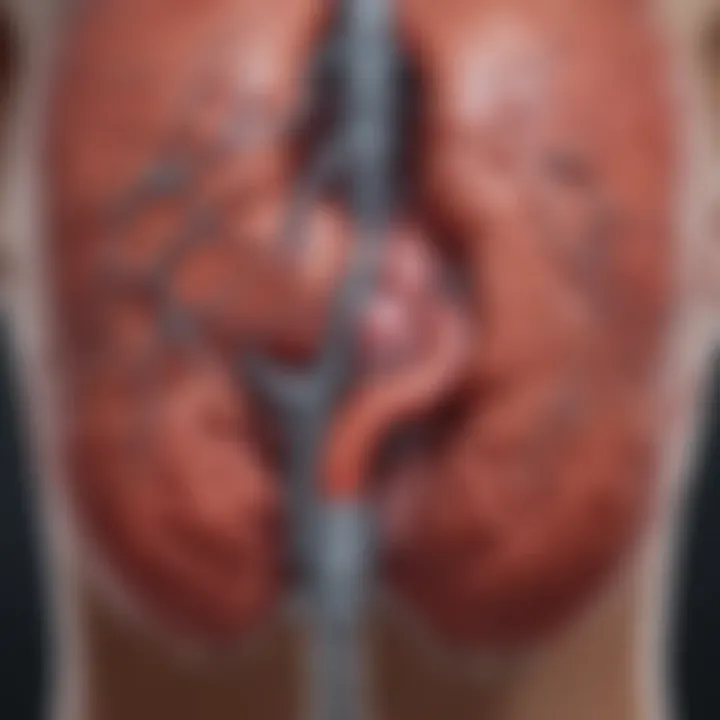Exploring Alcohol Consumption Risks for Dialysis Patients


Intro
Understanding the relationship between alcohol consumption and dialysis is crucial for patients, healthcare providers, and caregivers. Dialysis serves as a lifeline for individuals with renal failure, allowing for the removal of waste and excess fluids from the blood. However, the impact of alcohol intake during this treatment can raise complex issues related to health, medication interactions, and emotional wellbeing. This exploration seeks to shed light on the myriad risks and considerations that come with drinking alcohol while undergoing dialysis, aiming to equip readers with knowledge for informed decision-making.
Article Overview
Purpose of the Article
This article aims to clarify the implications of alcohol use for individuals on dialysis. It examines how alcohol affects the body and kidney health, and identify the potential complications that may arise from its consumption. By addressing the physiological, pharmacological, and psychological components, the article aspires to present a nuanced understanding of the topic.
Relevance to Multiple Disciplines
The discourse around alcohol and dialysis intersects several fields including medicine, psychology, and sociology. Medical practitioners need to grasp the physiological effects of alcohol on renal health. Psychologists may find relevance in exploring the behavioral patterns around alcohol consumption among individuals managing chronic illnesses. Furthermore, social workers can contribute valuable insights into the societal pressures and stigmas faced by those on dialysis, particularly regarding alcohol use.
Research Background
Historical Context
Historically, the understanding of alcohol's impact on kidney function has evolved. Early medical literature often overlooked the relationship entirely or deemed it less significant. Recent studies, however, underscore the importance of monitoring alcohol intake among dialysis patients. As research in nephrology advances, it becomes increasingly clear that alcohol can influence treatment outcomes.
Key Concepts and Definitions
To navigate this topic effectively, several key concepts must be defined:
- Dialysis: A medical procedure that removes waste, excess fluids, and toxins from the blood when kidneys can no longer perform these functions.
- Alcohol consumption: The intake of alcoholic beverages, which can vary in frequency and quantity.
- Renal health: The state of kidney function, which is vital for maintaining overall bodily homeostasis.
- Medication interactions: Potential effects that alcohol may have on the effectiveness and safety of prescribed drugs.
Addressing these terms will provide a solid foundation for understanding the subsequent sections of the article.
Prelude
The intersection of alcohol consumption and dialysis presents a nuanced and critical area of discussion. Individuals undergoing dialysis face unique health challenges, making the understanding of alcohol's implications essential. This article aims to clarify the complexities surrounding drinking alcohol while on dialysis.
Several factors deserve careful examination. First, the physiological effects of alcohol on the body cannot be understated. Alcohol does not affect everyone equally, and its impacts can be magnified in patients with renal impairment. The altered metabolism and elimination processes in these individuals raise significant concerns regarding the safe intake of alcoholic beverages.
Another key consideration involves the interplay between alcohol and medications. Dialysis patients often manage a regimen of pharmaceuticals that may interact adversely with alcohol. Highlighting these interactions is necessary for safeguarding the health of individuals during treatment.
Moreover, psychological factors related to alcohol consumption warrant attention. For some patients, alcohol serves as a coping mechanism amidst the stress and lifestyle changes associated with dialysis. This article explores these dynamics to foster a deeper understanding of the necessity of informed choices.
In summary, the discussion here will address the risks, health impacts, and social dynamics related to drinking alcohol while undergoing dialysis. By providing evidence-based insights, the article emphasizes the importance of making informed decisions that prioritize the health and well-being of patients. This foundational understanding sets the stage for further exploration into various nuances of alcohol consumption in the context of dialysis.
Understanding Dialysis
Understanding dialysis is crucial when discussing the implications of alcohol consumption for patients undergoing such treatment. Dialysis serves as a vital medical intervention for individuals with impaired kidney function. This section will focus on its definition, types, frequency, and the impact of these factors on patients' health and lifestyle.
Definition and Importance
Dialysis is a medical procedure that artificially removes waste, excess water, and toxins from the blood. It is primarily used for patients with chronic kidney disease or acute kidney injury. This procedure plays a significant role in maintaining the body’s chemical balance and overall homeostasis when the kidneys can no longer perform these functions efficiently. Understanding dialysis is vital as it sets the foundation for recognizing how substances like alcohol can affect kidney function and overall health.
Types of Dialysis
Dialysis can be categorized into two main types: hemodialysis and peritoneal dialysis. Each type has its unique procedure and implications for the patient.
Hemodialysis


Hemodialysis is the most common form of dialysis. In this type, blood is filtered outside the body through a dialyzer, which acts as an artificial kidney. This method effectively removes waste products and excess fluids from the blood. One of the key characteristics of hemodialysis is the need for access to the bloodstream, typically through a fistula or graft.
Hemodialysis is popular due to its efficiency and the ability to remove larger waste molecules from the blood. However, patients must attend dialysis sessions regularly, usually three times a week, lasting about four hours each time. This schedule can be restrictive, impacting patients’ social lives and work commitments.
Advantages of hemodialysis include its high level of efficiency. On the downside, complications such as infection or low blood pressure can occur during or after the sessions.
Peritoneal Dialysis
Peritoneal dialysis, on the other hand, uses the lining of the abdomen, or peritoneum, as a filter for the blood. In this type, a special fluid is introduced into the abdominal cavity to absorb waste products, which are then drained out. The flexibility of peritoneal dialysis is a notable feature, offering patients more independence, as it can be done at home or while traveling.
This method is beneficial for those who prefer a less frequent clinic visit. However, peritoneal dialysis may require a higher level of patient compliance, and there is a potential risk of infection in the abdominal area, known as peritonitis.
Frequency and Duration
The frequency and duration of dialysis treatment greatly affect the patient’s quality of life. Hemodialysis typically requires patients to visit a dialysis center for sessions lasting four hours three times a week, while peritoneal dialysis can be performed multiple times daily, depending on the patient's needs.
The choice between these treatment options can influence not just physical health but also how patients choose to socialize or engage in activities, leading to further considerations regarding alcohol consumption. Understanding these elements is essential for gleaning insights into safe practices related to alcohol use in dialysis patients.
The Role of Alcohol in Health
Understanding the role that alcohol plays in individual health is crucial, especially for those undergoing dialysis treatment. This section aims to illuminate the complexities of alcohol's interaction with bodily functions, its physiological effects, and how it might influence health and well-being during dialysis. The insights derived here provide a foundational perspective on why this topic deserves careful examination.
Physiological Effects of Alcohol
Alcohol consumption affects several systems within the body, primarily the central nervous system. When alcohol enters the system, it acts as a depressant, inhibiting the functions of neurotransmitters. This can lead to decreased coordination, slowed reflexes, and impaired judgment. While moderate drinking might not have severe immediate consequences for healthy individuals, these effects can be exacerbated in individuals on dialysis.
For patients in dialysis, the risks multiply significantly. Their bodies already face challenges due to the reduced efficiency of their kidneys. Alcohol can further impair renal function indirectly by causing dehydration, especially if consumed in excessive amounts. Dehydration leads to fluctuations in blood pressure, which can complicate dialysis treatments.
Additionally, alcohol can affect blood sugar levels. For diabetic patients, this presents a unique challenge as unstable blood sugar can lead to further complications.
Metabolism of Alcohol
The metabolism of alcohol is a vital aspect in understanding its implications for individuals on dialysis. When alcohol is ingested, it is primarily processed by the liver. The enzyme alcohol dehydrogenase breaks down ethanol into acetaldehyde, which is then converted to acetic acid and eventually eliminated from the body. The speed of this metabolism is influenced by various factors including the individual’s body weight, age, and overall health.
In the context of dialysis patients, liver function may already be compromised. This can lead to slower metabolism of alcohol, resulting in prolonged intoxication. The accumulation of alcohol can lead to toxicity, raising further concerns.
Moreover, alcohol interacts with many medications commonly prescribed to dialysis patients, including antihypertensives and pain relievers. These interactions can alter the effectiveness of treatments, leading to potential health risks.
"Understanding how your body metabolizes alcohol is key to making informed decisions about consumption, especially in a compromised state like dialysis."
"Understanding how your body metabolizes alcohol is key to making informed decisions about consumption, especially in a compromised state like dialysis."
In summary, recognizing the physiological effects and metabolic processes of alcohol is essential in understanding its risks for individuals on dialysis. Awareness of these factors can guide patients in making safer choices regarding alcohol consumption.
Alcohol Consumption and Dialysis
The relationship between alcohol consumption and dialysis is significant and warrants thorough examination. Individuals on dialysis face unique health challenges, and understanding the impact of alcohol is essential for maintaining optimal well-being. Dialysis treatment itself alters various bodily functions. Knowing how alcohol can affect these processes is crucial.
This section delves into essential aspects of alcohol consumption for those undergoing dialysis. We will explore specific elements such as the physiological effects of alcohol, potential benefits and risks, and considerations that patients should keep in mind. Here, the risks involved are worth a comprehensive look due to the delicate balance that dialysis patients must maintain in their health regimen.
"Understanding the implications of even small amounts of alcohol is vital for anyone undergoing dialysis treatment.”
"Understanding the implications of even small amounts of alcohol is vital for anyone undergoing dialysis treatment.”


Short-Term Effects
Short-term alcohol consumption can lead to immediate physiological responses in dialysis patients. Alcohol acts as a depressant, which means it can impair cognitive function and coordination. This effect can be particularly dangerous for patients who might already be experiencing fatigue or weakness related to their treatment.
Among the short-term effects of alcohol, we find:
- Dehydration: Alcohol is a diuretic, which can cause increased urine output and lead to dehydration. This is risky for patients on dialysis, as they need to manage fluid levels closely.
- Blood Pressure Changes: Alcohol may cause fluctuations in blood pressure, which can complicate the already intricate management of blood pressure in dialysis patients.
- Increased Risk of Falling: The impairing effects of alcohol may increase the likelihood of accidents, especially in those with mobility issues.
Patients should be aware of these effects, as they can exacerbate existing health problems.
Long-Term Consequences
The long-term consequences of alcohol consumption while on dialysis are multifaceted and often severe. Chronic alcohol use can result in several adverse health effects:
- Liver Damage: Alcohol can be detrimental to liver function. Patients who also need a healthy liver may find their overall treatment outcomes compromised.
- Nutritional Deficiencies: Alcohol provides empty calories and can displace nutritional foods. This can lead to malnutrition, which is already a concern for those undergoing dialysis.
- Medication Interactions: Many dialysis patients are prescribed medications that help them manage various health issues, including hypertension and anemia. Alcohol can alter how these medications are metabolized, potentially diminishing their effectiveness or increasing side effects.
In the long run, the implications of these effects can lead to hospitalizations, additional medical complications, and a decrease in quality of life. Patients must consider both short and long-term risks seriously when making decisions about alcohol consumption.
Health Risks of Alcohol While on Dialysis
Understanding the health risks associated with alcohol consumption during dialysis is crucial for patients navigating their treatment paths. Dialysis is already a complex and life-altering process, and the addition of alcohol can introduce further complications. Alcohol has various physiological effects that can significantly impact renal health, disrupt fluid and electrolyte balance, and interact negatively with prescribed medications. Each of these aspects deserves careful attention to ensure patient safety and optimal health outcomes.
Renal Health Implications
When individuals undergoing dialysis consume alcohol, the implications for renal health can be serious. Alcohol is a toxin that requires the body to exert energy in processing it. This filtration process puts additional strain on an already compromised renal system.
Patients with kidney disease often have a reduced ability to flush out toxins. The presence of alcohol in the body can exacerbate this issue, potentially leading to a toxic buildup. Excessive alcohol intake can lead to more severe health problems, such as acute kidney injury, which can be life-threatening.
In addition, alcohol can contribute to the progression of chronic kidney disease (CKD). It can induce inflammation and oxidative stress in kidney tissues, further damaging the kidneys. Studies have shown a correlation between heavy drinking and increased morbidity in patients with CKD. Monitoring alcohol consumption is, therefore, essential for those on dialysis, to minimize these health risks.
Fluid and Electrolyte Imbalance
Fluid and electrolyte balance is a vital consideration for dialysis patients. Alcohol is known to have diuretic properties, leading to increased urine production and potentially significant fluid loss. This effect can complicate fluid management strategies that are already in place for dialysis patients.
As a result of dehydration, patients can face a variety of symptoms, including fatigue, dizziness, and muscle cramps. More dangerously, significant fluid loss can lead to electrolyte imbalances. Electrolytes, such as sodium and potassium, are crucial for maintaining heart and muscle function. Disharmonies in these elements caused by alcohol intake may result in arrhythmias, confusion, or even seizures.
The dialectic relationship between alcohol consumption and fluid management under dialysis treatments highlights the need for patient education regarding hydration and substance use.
Interactions with Medications
Patients on dialysis often take medications to manage their condition and related health issues. Alcohol can interfere with the effectiveness of these medications or increase their toxicity. Most notably, substances such as antihypertensives, diuretics, or any medications that suppress the immune system can be affected by alcohol consumption.
Important Note: Always consult healthcare providers before making any changes to diet or substance intake.
Important Note: Always consult healthcare providers before making any changes to diet or substance intake.
Moreover, alcohol can also alter the metabolism of drugs processed by the liver, which can vary from person to person. This variability can affect the concentration of medication in the bloodstream, leading to either insufficient effects or heightened risks of side effects. Understanding these interactions is essential for safe management of one’s treatment plan.
In summary, the implications of alcohol on health for patients undergoing dialysis cannot be understated. There are significant concerns regarding renal health, fluid dynamics, and medication interactions. As such, patients should be proactive in discussing their alcohol consumption with healthcare providers to ensure comprehensive and safe treatment planning.
Psychological Aspects of Drinking Alcohol
Understanding the psychological aspects of drinking alcohol is crucial for individuals on dialysis. This examination goes beyond mere health implications and delves into the intertwined relationship between alcohol use, mental well-being, and social life. For many individuals, alcohol can serve as a coping mechanism or a social lubricant. Recognizing these factors can aid healthcare providers and patients in making informed decisions regarding alcohol consumption while on dialysis treatment.


Coping Mechanisms
For some patients, alcohol serves as a way to cope with the stress and anxiety associated with chronic illness and dialysis. The treatment process can be exhausting, and some individuals turn to alcohol as a means to escape or soften the harsh realities of their condition. However, this coping strategy can produce more harm than good. Alcohol may temporarily alleviate feelings of sadness or anxiety, but it is also linked to increased risk of mental health issues such as depression and addiction in patients with renal problems.
Patients need to assess the reasons behind their alcohol consumption. Seeking healthier alternatives for stress management can be productive. Activities such as exercise, meditation, or joining support groups provide beneficial outlets for dealing with emotional distress without the detrimental effects of alcohol. Acknowledging these mechanisms can empower individuals to make better choices regarding their mental health while adhering to their treatment.
Social Dynamics
The role of social interactions in alcohol consumption cannot be overlooked. For many individuals, social drinking is a norm, and during gatherings, the pressure to conform can be immense. This presents a challenge for dialysis patients as they may face social isolation due to dieting constraints that come with their treatment.
The dynamics of social settings often create a conflict between adhering to dietary restrictions and maintaining social ties. Patients might feel compelled to drink to fit in, which can cause tension between their health needs and social obligations. Discussing these dynamics openly with friends and family can foster understanding and support. Patients may consider bringing non-alcoholic options to gatherings, allowing them to participate without engaging in alcohol consumption.
"Feeling included is essential, but it should not come at the cost of one's health."
"Feeling included is essential, but it should not come at the cost of one's health."
Managing these social pressures can be challenging, but it is necessary for the preservation of both physical and mental well-being. Relationships that support a healthy lifestyle are invaluable and can make a significant difference in the recovery journey of dialysis patients.
In summary, alcohol consumption while on dialysis poses challenges that go beyond physiology. Understanding the psychological aspects involved helps shape strategies for coping and maintaining social connections, ensuring patients prioritize their health in the face of societal pressures.
Recommendations for Patients
When it comes to alcohol consumption during dialysis, the stakes are significant. Patients undergoing dialysis must approach this topic with caution. The implications of drinking alcohol can be far-reaching, affecting not just renal health but overall well-being. Awareness and informed choices are vital.
Guidelines for Alcohol Intake
It is crucial for patients on dialysis to have clear guidelines about alcohol intake. Here are some recommendations to consider:
- Limit Intake: Alcohol consumption should be restricted. Excessive intake can lead to complications such as dehydration or fluid overload.
- Choose Wisely: If consuming alcohol, opt for lower-alcohol beverages. Actually, beer may be a better option compared to spirits, which are often higher in alcohol content.
- Monitor Consumption: Keeping track of how much alcohol is consumed can help in managing potential health risks. Even moderate drinking can be harmful.
"Understanding personal limits is key for individuals on dialysis. Every case is unique, and guidelines may vary."
"Understanding personal limits is key for individuals on dialysis. Every case is unique, and guidelines may vary."
Consultation with Healthcare Providers
Open communication with healthcare providers is imperative. Patients should not hesitate to discuss alcohol consumption with their nephrologists or dietitians. The following points highlight the importance of this consultation:
- Personalized Advice: Each patient's medical history is different. Consulting healthcare professionals allows for personalized guidance that aligns with individual health needs.
- Understanding Risks: Doctors can explain the specific risks associated with alcohol for each patient, considering their ongoing treatment and general health.
- Regular Check-Ups: Maintaining regular appointments can help in monitoring any changes in health status, including the effects of alcohol consumption if applicable.
End
The topic of alcohol consumption for individuals on dialysis is critically important and multifaceted. It encompasses various elements that affect both physical and mental well-being. In this article, we navigated through the complexities surrounding alcohol and its interaction with dialysis treatment.
Key Takeaways
- Health Risks: The physiological effects of alcohol can exacerbate existing health conditions, notably impacting renal health. Understanding these relationships is vital for patients.
- Interaction with Medications: Many dialysis patients are prescribed medications that could interact negatively with alcohol. Awareness of these interactions can prevent serious complications.
- Psychological Considerations: The social and psychological dynamics of alcohol use highlight the need for a comprehensive understanding of why individuals may seek alcohol as a coping mechanism. This knowledge is crucial for developing effective support systems.
Informed Decision-making
At the core of our discussion is the need for informed decision-making. Patients should consult with healthcare providers regarding alcohol use. This dialogue enables individuals to understand their specific risks and make choices that align with their health conditions.
Future Considerations
As research continues to evolve, staying updated on new findings related to alcohol consumption and dialysis will be essential for both patients and caregivers. Ongoing education is vital in adapting to changes in guidelines and recommendations. Patients should view these discussions with their healthcare teams as ongoing conversations that evolve with their circumstances.
"Drinking alcohol while on dialysis is not a trivial matter; it requires a thoughtful approach and understanding of one’s health status."
"Drinking alcohol while on dialysis is not a trivial matter; it requires a thoughtful approach and understanding of one’s health status."
In summary, this conclusion underscores the necessity of a cautious and informed approach to alcohol consumption among dialysis patients. By fostering education and promoting communication with healthcare providers, individuals can navigate the complexities of their health with clarity and purpose.



